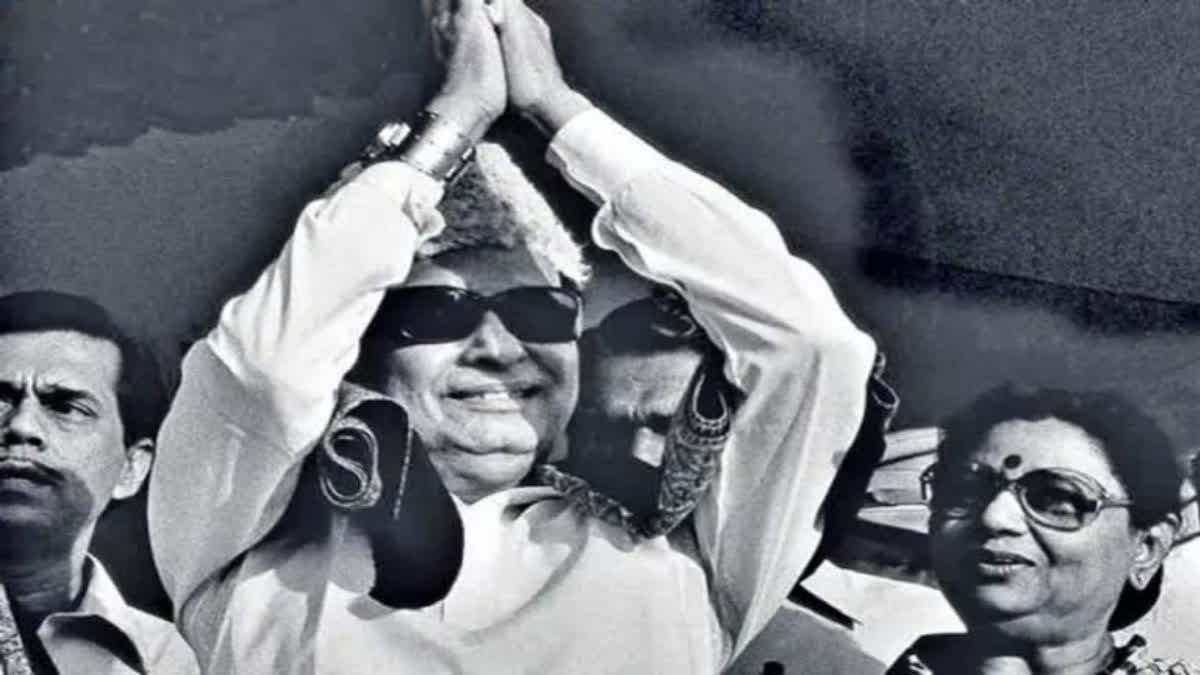Chennai:A plain commercial movie sans any political overtones or punch dialogues, 'Ulagam Sutrum Valiban' (Youth Going Around the World) turned out to be one of the all-time blockbusters of matinee idol MGR, simply because it was caught in the web of politics. It had all the usual stuff of an MGR movie that his fans yearn for but was devoid of any ideological message. The changed political climate consequent to the expulsion of MGR from the DMK, then in power, and his launching a party well before its release witnessed a concerted effort to stop it from being screened. As such, it was the context that gave it an aura.
When the production commenced, MGR was with the DMK, and the party president and Chief Minister M Karunanidhi himself saw him off at the airport when the film crew left for Japan for the shoot. Having grown up in the Dravidian movement and in filmdom together, both were thick pals. Interestingly, it was the third from MGR's own production house and his second directorial venture. Till then, he was riding on two horses – politics and movies.
'Exciting and intriguing were the developments that preceded the movie's release, making them more interesting than the film itself. To checkmate the rise and popularity of MGR, the wily Karunanidhi had propped his son, 'Mu Ka Muthu', who imitated the matinee idol, and his debut movie, 'Pillaiyo Pillai' was a box office success. This would have probably rattled MGR and things changed dramatically after he questioned the DMK leadership at a public meeting in Thirukazhukundram near Chennai. It saw his expulsion from the party on October 10, 1972, forcing him to launch the ADMK ten days later. This cast a long shadow on the release of the movie, made with a huge budget.
Also read:Did you know MGR jumped on a moving train to fulfill his wife's wish?
The MGR Fan Clubs, an integral part of the DMK, were dissolved and replaced with that of 'Mu Ka Muthu' and he was vilified by the DMK platform speakers, questioning his ethnic origin. Media houses aligned with the establishment carried out a smear campaign. He faced Income-Tax issues as well from the Union government under Indira Gandhi's tenure.
“The film was released in June 1973, despite threats from DMK functionaries to disrupt it. In many places, cinemas had shunned it. In Madurai, the Mayor, Muthu, said he would wear a saree if the movie was released. But, it ran houseful creating a new record. And, he was heckled by MGR followers who put up sarees in front of the Railway Junction and asked him to select a piece of his choice. Since no cinema in Thoothukudi had screened it, I came to Madurai to watch it when I was a 12-year-old school student,” recalls V Mariappan, a senior journalist. “Fighting his back to the wall, MGR assured theatre owners to pay them if there was any damage to property. In many places, villagers came in droves in bullock carts to towns to see the movie. It ran for 210 days at Meenakshi theatre in Madurai,” he added.
“It was a visual treat for MGR fans with scintillating songs and dance with fights, enthralling the audience. The 1970 Expo in Osaka, Japan was shown in its entirety in a song. Some scenes were shot in Chennai itself. Since the tax on posters was hiked exorbitantly, stickers were used on autos and in shops for advertisement. In Chennai's Devi Paradise cinema, it broke the record of MacKenna's Gold in collections as well as the film that ran for most days,” recalls 70-year-old Chandramohan of Kodambakkam, a die-hard MGR fan walking down memory lane.
What is the story? The movie tells the story of a scientist, Murugan (MGR), who invents a method to store the energy from lightning. He announces it at a convention of scientists in Japan, but fakes to destroy it since it might go into the wrong hands. He has kept the secret in pieces at Buddhist shrines in Japan and Thailand and the villain, who tries to lay his hands on it, keeps Murugan and his lady love in his custody. How Murugan's brother Raju (MGR) saves his brother is the story. The digital release of the movie, too, was received well in 2021.
Days later, in the Lok Sabha by-poll from Dindigul in 1973, the AIADMK won handing down the DMK the third place with the Congress taking the second place. Since then, there was no looking back for MGR. In the subsequent Assembly polls in 77, the ADMK won a massive mandate catapulting him as the Chief Minister. “A film that would have passed off silently as yet another MGR potboiler was wantonly blown out of proportion to the point of being a launchpad for a commercially successful actor into a political icon,” reasons Mariappan.
